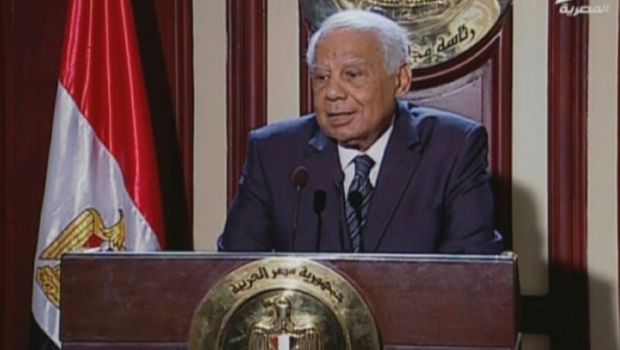
An image grab taken from Egyptian state TV shows Egypt’s Premier Hazem El-Beblawi addressing the media in Cairo on February 24, 2014. (AFP PHOTO / EGYPTIAN TV)
Beblawi did not specify why the cabinet had resigned during the announcement but said it had “made every effort to get Egypt out of the narrow tunnel in terms of security, economic pressures and political confusion.”
The decision comes after weeks of strikes and demonstrations by workers in several sectors including textile workers, doctors and taxi drivers amid worsening economic conditions.
An official source told state-run Al-Ahram that the resignation would be accepted by Mansour, who will be appointing Ibrahim Mahleb, the housing minister in Beblawi’s Cabinet, as the new prime minister.
The resignation was made following a 15-minute Cabinet meeting attended by current Minister of Defense and Army chief Abdel-Fattah El-Sisi, according to Al-Ahram.
An unnamed Egyptian official speaking to Reuters said the move effectively paved the way for Sisi to enter the presidential race due to take place by April. “This [government resignation] was done as a step that was needed ahead of Sisi’s announcement that he will run for president,” the official said.
He told Reuters the Cabinet had resigned en masse so that Sisi would not appear to be acting alone.
Egyptian law bars military figures from becoming president. Sisi would have to resign from the military and his post as defense minister in order to seek the position.
Sisi has become increasingly popular in Egypt since his role in ousting Mursi, with several political and civil society groups reportedly collecting millions of signatures urging him to run for the presidency.
The resignation comes a day after Mursi was accused by prosecutors—along with 35 others including Muslim Brotherhood Supreme Guide Mohammed Badie—of espionage and revealing defense secrets to foreign parties.
The prosecution called it “the biggest case of conspiracy in Egypt’s history.”
Public Prosecutor Tamer Farjani said Mursi and the other defendants communicated with foreign organizations including Hezbollah, Hamas and Iran’s Islamic Revolutionary Guard Corps with the aim of carrying out terrorist acts inside Egypt.
He said the defendants had “revealed defense secrets to a foreign state or its agents, funded terrorism, provided funding and military training for terrorist groups in order to achieve the aims of the International Muslim Brotherhood and carried out acts which harm the independence of the country, its unity and the safety of its territory.” The charges carry the death penalty.
This was the second hearing in the trial after Mursi’s defense team withdrew from proceedings early last week in protest over the defendants being held in a glass cage during the trial.
Mursi’s defense lawyer Mohamed Salim Al-Awa said he couldn’t hear the former president through the cage which, despite being equipped with microphones allowing sound to be transmitted to those outside, is under the entire control of the presiding judge.
The cage was introduced after Mursi interrupted proceedings during a previous trial, shouting at the judge while he spoke and refusing to accept his authority or answer his questions, saying his appointment was “invalid.”
Mursi’s defense team has requested that he not be placed in the cage in future trials and has asked for the removal of the trial judge, Sha’aban El-Shamy, claiming there is “enmity between him and the defendants.” The trial has now been delayed until February 27.
Mursi is currently being tried in three others cases, including inciting violence against protesters in early 2013, fleeing from prison and aiding the escape of other inmates during the 2011 uprising and insulting the judiciary during one of his final speeches as president.
